Research & Publications >> Neeeds Assessment Study Reports
Needs Assessment Study Reports
| S.No | Title Page | Project Title | Abstract/Background |
|---|---|---|---|
| 1 | 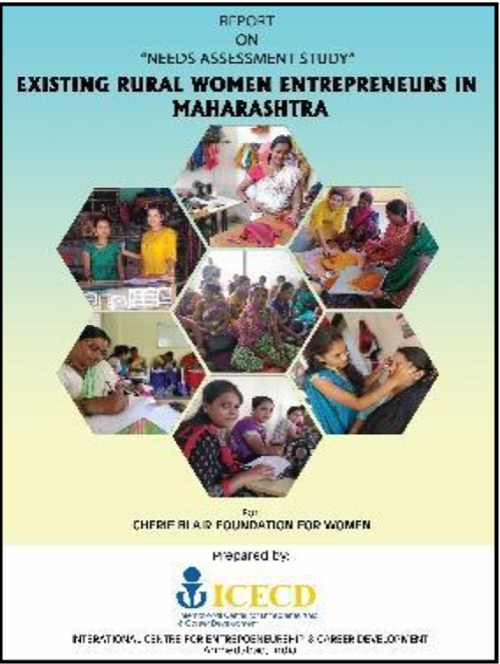 | Report on Needs Assessment Study: Existing Rural Women Entrepreneurs in Maharashtra | This study is carried out with the aim to develop the local economy by nurturing entrepreneurial potential of the rural women entrepreneurs towards sustainable income generation, more specifically for the identified target group of existing rural women entrepreneurs in Pune, Maharashtra. The objective is to identify the existing status of BDS providers as well as training needs of these rural women entrepreneurs and thus identify the topics for training to improve their capacity to earn better. The study has been carried out based on literature review, collection of primary data and secondary data. ICECD (International Centre for Entrepreneurship & Career Development) collected the primary data from 100 rural women entrepreneurs from 11 villages across Pune district. Interviews of existing rural women entrepreneurs and BDS providers were conducted and the information collected supported the analysis about their personal and environmental potential and problems of business as well as the socio-economic ecosystem in which the women entrepreneurs operate. |
| 2 |  | Report on Training Needs Assessment for Capacity Building: Workshop for Lighting India – Frontier Markets (SJS) | Whether a woman is from urban slums, rural or tribal areas, she generally lacks direction, not because she lacks capability but because she has remained in the periphery of the society and is underprivileged in terms of education, skills, access to resources and knowledge, thus adding to the already high unemployment figures of the nation. The formal financial sector, whose attempts although meant well, mostly bypassed them because of the lack of need‐based policies, a flexible system of implementation as well as an inexistent credibility of the women in the market. Many social reformers in different parts of India tried to better the lot of women by educating them and helping them through welfare activities. Various state and central government schemes were announced which also had a welfare approach. Little or no effort is made to utilize this idle human resource into gainful employment to lead them towards sustainable socio‐economic empowerment. Moreover, a lack of effective information flow results in huge gaps between policies and practices. |
| 3 |  | Final Report on Needs Assessment Study: Assessing Scope for Digitization of Whole or Part of Saksham/Tejasvani Module for an Online Training Solution | Lighting Asia/India is an IFC program that aims to increase access to clean, affordable energy in rural India by promoting modern off-grid lighting products and systems, and efficient DC appliances. The program works with the private sector to remove market entry barriers, provide market intelligence, foster B2B linkages and raise consumer awareness on modern lighting options. The program is focusing its efforts in the states of Bihar, Uttar Pradesh, Rajasthan, Odisha and Assam. The program is designed with a series of interventions to alter market behaviour by removing specific barriers for the market created by poor quality products, the lack of information available to customers and distribution channel partners, poor business skills among distribution partners (distributors, retailers, and entrepreneurs) etc. To address the barrier of poor business skills of distribution partners specifically, IFC aims to support Associates in strengthening their supply chain through targeted training interventions with entrepreneurs, retailers and internal training staff of Associates. |
| 4 | 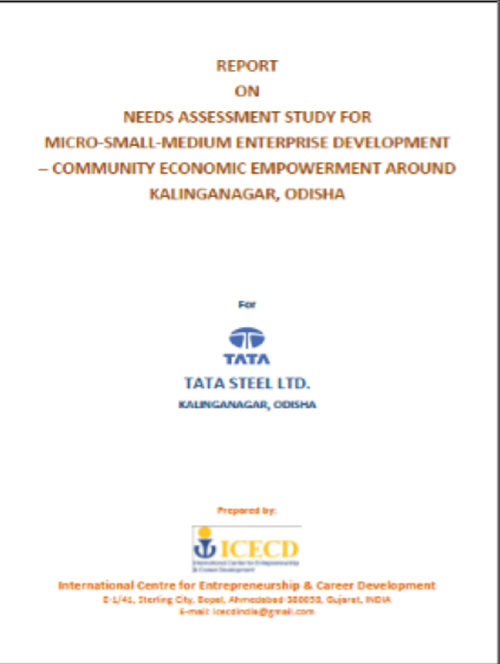 | Report on Needs Assessment Study for Micro-Small-Medium Enterprise Development – Community Economic Empowerment Around Kalinganagar, Odisha | The Kalinganagar Industrial Complex is the outcome of the Govt. of Odisha’s efforts to transform the mission statement of Industrial Policy Resolution, 2001 into a reality viz. “Create a business climate conducive to accelerating investment in industry and infrastructure projects, raise income, employment and economic growth in the state, reduce regional disparities in economic development.” The state government acquired 13000 acres of land in Sukinda constituency of Jaipur district of Odisha in 1992. On November 17, 2004, an MOU was signed between Government of Odisha and Tata steel where state government agreed to provide 3471.808 acres of land to Tata Steel Ltd for setting a 6 million tonne plant in Kalinganagar. TATA Steel Ltd. at Kalinganagar has thus acquired 3,471 acres to put up a plant for producing 6 million tons of steel which is now in construction and erection stage. It is envisaged that the plant will be operative by 2014. The plant site is at Dubari (Kalinganagar), 120 kms. from Bhubaneshwar and situated by the side of National Highway 200 and 17 kms. from the nearest railway station, Jaipur Road. It will generate revenue of Rs. 2,200 crores and direct and indirect employment to 20,000 people. |
| 5 | 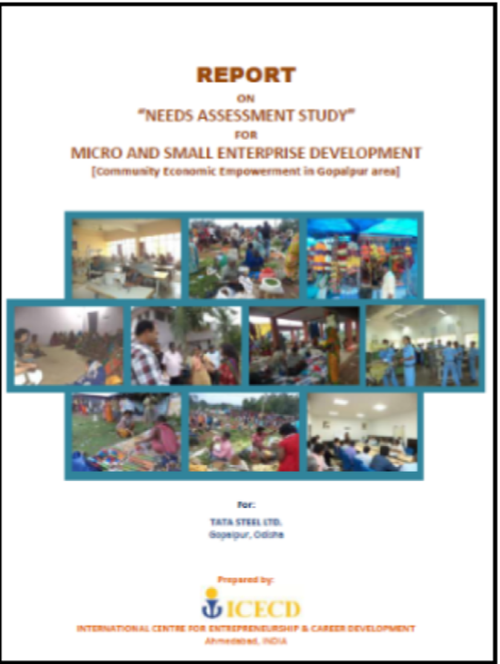 | Report on Needs Assessment Study for Micro and Small Enterprise Development (Community Economic Empowerment in Gopalpur area) | With rapid economic growth, and increased awareness about how such growth impacts on areas / communities, it has become evident to the policy makers / corporate sector that local micro, small and medium enterprises/businesses (MSMEs) need to play a substantially larger role in the supply chain and a focus on generating employment for the local community needs to be kept in sight, especially by those who are affected by such development. To meet these needs and to create a multiplier effect of local employment, increased earnings and capital formation, government agencies/financial institutions and a number of industries (corporate sector) have started thinking in this direction and are involved in the task. Their approach has to integrate much more than simple compensation package/handouts to genuine efforts related to the development of local population, local economy and making them participate in the overall economic development that they are bringing about. |
| 5 |  | Report on Needs Assessment Study for Micro and Small Enterprise Development (Community Economic Empowerment in Gopalpur area) | With rapid economic growth, and increased awareness about how such growth impacts on areas / communities, it has become evident to the policy makers / corporate sector that local micro, small and medium enterprises/businesses (MSMEs) need to play a substantially larger role in the supply chain and a focus on generating employment for the local community needs to be kept in sight, especially by those who are affected by such development. To meet these needs and to create a multiplier effect of local employment, increased earnings and capital formation, government agencies/financial institutions and a number of industries (corporate sector) have started thinking in this direction and are involved in the task. Their approach has to integrate much more than simple compensation package/handouts to genuine efforts related to the development of local population, local economy and making them participate in the overall economic development that they are bringing about. |
| 6 | 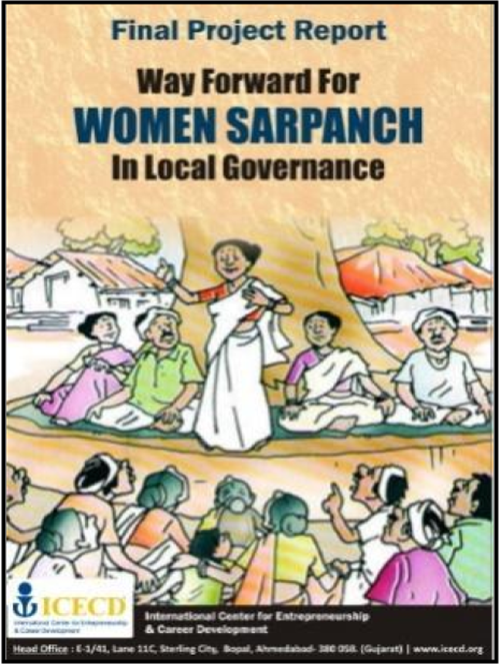 | Final Project Report: Way forward for Women Sarpanch in Local Governance | Affirmative action through the 73rd Amendment Act had created a massive rise in the numerical strength of women in PRIs as Sarpanch in our country. It is mandatory to take a note that the impact of quotas for women in political systems have gone well beyond the federal and state legislatures and women’s participation in leadership position has exhibited an extremely important process of change occurring at the village level. However, the elected women sarpanches and members continue to suffer under the “dichotomy” of power in the panchayat and the relative powerlessness within their home. In addition, Scheduled Caste and Scheduled Tribe and other Communities women sarpanches face structured inequalities that cannot be captured or managed through conventional social scientific methods, it would be necessary to look at the culture and mechanisms of social satisfaction to account for outcome in these women. |
| 7 | .png) | Final Report on Comprehensive Socio-economic Assessment of Project Catchment Area of Vododara-Halol toll Road, Gujarat | IL&FS is pioneer in infrastructure development on PPP format in India. It has established track record in promoting and financing of public infrastructure in environmentally and socially friendly manner in conformation to its Environmental and Social Policy and Framework (ESPF). As such infrastructure projects are developmental projects having huge potential to impact socio-economic of the region. Because of longer concession periods of infrastructure projects (usually in 25-30 years) and longer presence and involvement of IL&FS in particular geography, IL&FS is eminently positioned to catalyse the socio-economic development of its project catchment area to meet the multiple development needs of the area. In this context, IL&FS intends to act as facilitator by active participation and partnering in socio-economic development of the project catchment area. The overall goal and objective will be to enhance the local economy and improve quality of life of the communities in the project catchment area through discreet surround set of socio-economic interventions that would lead to above goals. |
| 8 | 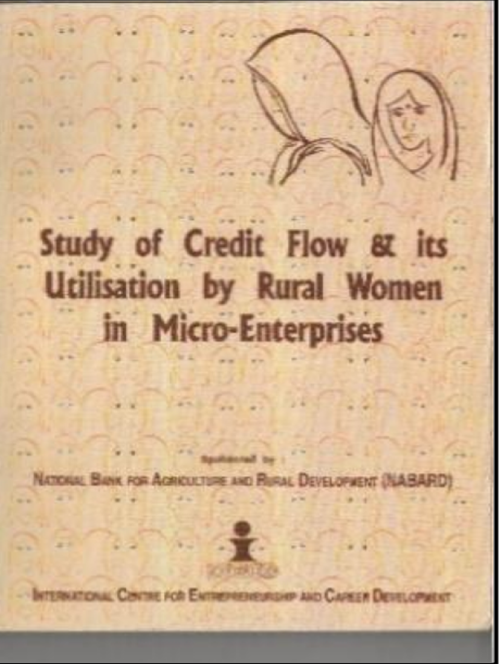 | Study of Credit Flow and its Utilisation by Rural Women in Micro-Enterprises | Over last two decades, India has been engaged in promoting and developing rural entrepreneurship. Special efforts have been made in developing women as entrepreneurs through systematic entrepreneurship development programmes as well as facilitating these efforts with specialised women focused credit schemes. This has resulted in accelerating growth in the rural women owned micro enterprise sector and thus creating new employment opportunities. Special training programmes and efforts to train and promote women as entrepreneurs is a relatively recent phenomenon, but it has already reached a stage where their contribution in national economy has assumed importance. This research study was undertaken by International Centre for Entrepreneurship and Career Development (ICECD), Ahmedabad under sponsorship from National Bank for Agriculture and Rural Development (NABARD). The research study pertains to the Credit Flow and its Utilization by Rural Women in Micro-Enterprises, and was conducted in the states of Gujarat and Tamil Nadu. |
| 9 | 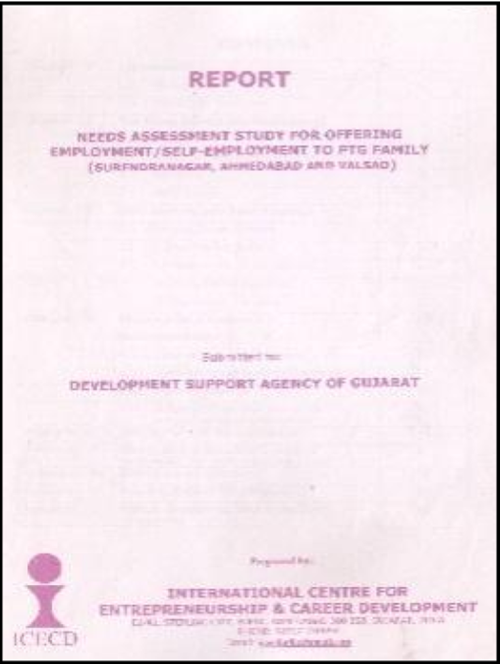 | Report on: Needs Assessment Study for Offering Employment/Self-employment to PTG Family (Surendranagar, Ahmedabad and Valsad | Economic development plays an important role in the growth of any society particularly for a country like India. This can be achieved by creation of micro/small entrepreneurs or developing marketable skills amongst youth (including women) in the country. In the current phase of rapid globalization and industrialization, which involved technological growth and setting up of market-oriented businesses, the role of tribal men and women is marginal and secondary. This may be due to their location, education level, lack of resources and many other socio-economic reasons that are considered as constraints in their development process. But it is high time that some concreate steps are taken to mainstream this population as development partners. Despite efforts made over past few decades, rural poverty in India still hovers around 25%. While our poverty alleviation programs have been strengthened in successive years, the absolute number of rural poor – below poverty line (BPL), remain almost static around 240 millions. |
| 10 | 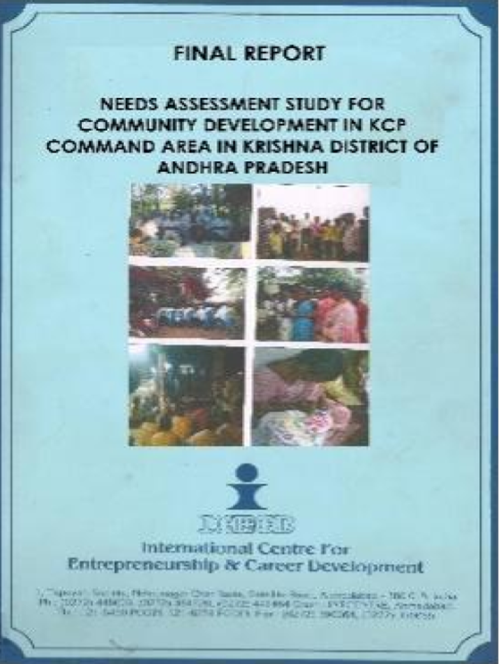 | Final Report: Needs Assessment Study for Community Development in KCP Command Area in Krishna District of Andhra Pradesh | With globalization, opening of economies, rapid economic growth, rapid increase in the wealth (especially rural wealth) and increased awareness, the growth process impacts on areas/communities in several spheres, and may change things dramatically. Hence, it has become increasingly evident to the policy makers/corporate sector that neglecting core developmental issues within the rural communities (under their sphere of influence) will impact adversely on their commercial/political interests, in a short time span (e.g., changing economics of agriculture, social issues facing agriculturalists, or need for promotion of local enterprises/businesses (MSMEs). It is no longer possible to be complacent, as such changes used to impact after a sufficiently long time, and these impacts could be thwarted by relationships and respect earned in the past. The corporate sector, in collaboration with all other stakeholders, need to playa substantially larger role in the developmental sector/issues and the supply chair management. A sharp focus on generating appropriate opportunities (both in basic agricultural livelihood and non-farm employment/self-employment) to satisfy the local community needs is urgently needed. |
| 11 | 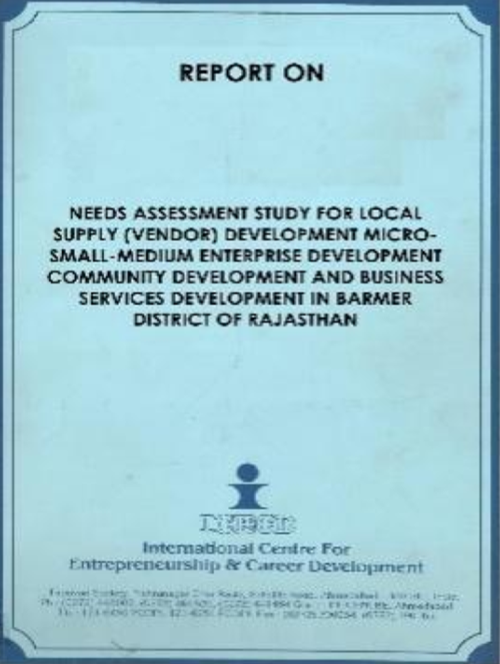 | Report on Needs Assessment Study for Local Supply (Vendor) Development Micro-Small-Medium Enterprise Development Community Development and Business Services Development in Barmer District of Rajasthan | With rapid economic growth, and increased awareness about how much growth impacts on areas/communities, it has become evident to the policy makers/corporate sector that local micro, small and medium enterprises/business (MSMEs) need to play a substantially larger role in the supply chair and a focus on generating employment for the local community needs to be kept in sight, especially those who are affected by such a development. To meet these needs and to create a multiplier effect of local employment, increased earning and capital formation, government agencies/financial institutions and a number of industries (corporate sector) have started thinking in this direction and are involved in the task. Their approach has to integrate much more than simple compensation package/handouts to genuine efforts related to the development of local population, local economy and making them participate in the overall economic development that they are bringing about. |
| 12 |  | Report on Participatory Assessment of UNIFEM Interventions for Gender and Small and Micro Enterprises Development for Women in the Arab Region | The main focus on UNIFEM’s Economic Empowerment Programming in the region is on creating opportunities for women’s sustainable livelihoods within the context of the socio-economic conditions, globalization and trade liberalization. UNIFEM’s economic empowerment programming, therefore, incorporated project activities at all levels – macro, meso and micro. It has implemented a series of activities between 1997 and 2001 for women’s SME development. As a further step, the consultant was asked to review and assess the past experiences of UNIFEM Women’s Enterprise Development initiatives in the region, in context of small and micro enterprise development for women and to facilitate to launch UNIFEM’s new project entitled Regional Technical Resource Network for Women’s Small and Micro Enterprises in Arab States (TRN). The overall aim of the project is to increase women’s access to a control of economic resources in the region. |
| 13 |  | Report on Base-line Survey of Panchamahal & Sabarkantha Districts for MED Activities | Swa-Shakti is a five-year project sponsored by the Central government with financial support from the World Bank and International Fund for Agriculture Development (IFAD) to be implemented in 6 states of India – Gujarat, Bihar, Haryana, Karnataka, Madhya Pradesh and Uttar Pradesh for the empowerment of the poor and marginalized rural women. For the state of Gujarat, the project has initially taken under its fold the 4 districts of Panchamahal, Sabarkantha, Bharuch and Surendranagar. It has engaged NGOs already operating in the areas to form a total of 1200 women Self-Help Groups (SHGs), each having 20 women, thus taking the target to 24,000 rural women. The project is being implemented in Gujarat by GWEDC (Gujarat Women Economic Development Corporation) with ICECD acting as the MED resource organization for developing entrepreneurship among rural women which forms an important part within the overall programme aims of Swa-Shakti. |
| 14 | 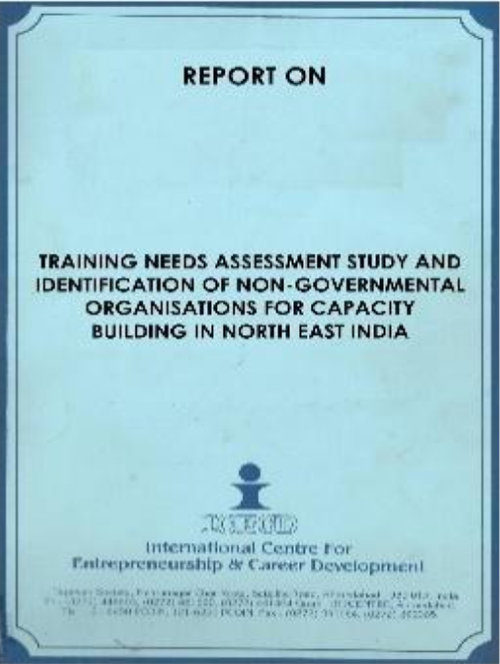 | Training Needs Assessment Study and Identification of Non-governmental Organisations for NGO Capacity Building in North East India | The term “Women in Development” has become very important in all national/international developmental agenda. The development policies and programmes since early 1960s have attempted to bring women into the mainstream development. Women’s productive role has now been recognised and it has become common to address women in their productive capacity. India, which accounts for 16% of the world’s population and 36% of the poor in the third world countries, has been in the forefront of anti-poverty campaign for more than two decades. Now Disenchantment with the sluggish growth experience of 50d and 60s and the alleged failure of the development process to percolate down to the poorer groups and more to women had led to shift towards special poverty alleviation programmes with a tendency to focus exclusively on target groups. It was thus felt that the poverty alleviation programmes alone cannot lead to increase in productivity and income of the low-income household. This is where the intervention from non-government agencies become pivotal, all the more, when the emphasis became women specific. |
| 15 | 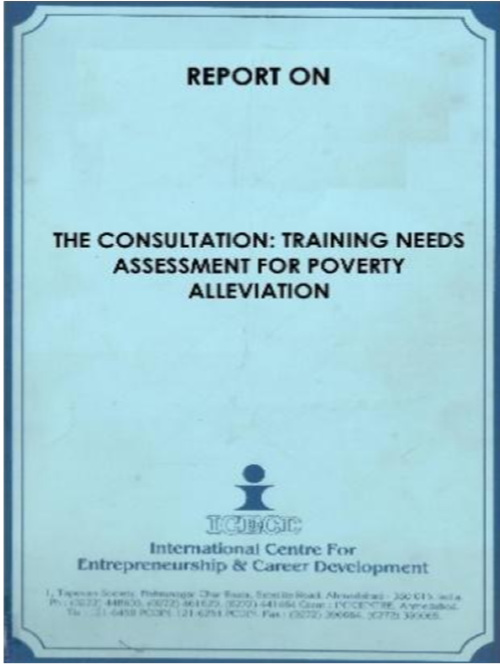 | Report on The Consultation: Training Needs Assessment for Poverty Alleviation | Development initiatives in the recent years have focused largely on involvement of the poor in mainstream economic activities through income-generation and self-employment strategies. The results achieved in the projects for poverty alleviation have left much to be done and this has created a necessity for government and non-government agencies to orient themselves and their approach to rethinking of overall strategy. The project implementation and the needs of the poor people need to synchronise, and participatory approach leading to sustainable development has slowly emerged as one of the most effective developmental tools. In this endeavour, special attention needs to be cast upon the deprived people whose personal growth is restricted due to lack of education, health and opportunities. The pressing need for increased income has created an urge in these people to take up income-generation activities. However, a large section of this target group finds it difficult to create a sustained source of income for themselves. This section of populations are those living in poverty because of a multitude of reasons, many being out of their control. Most of these people work within informal trade and businesses; as domestic servants; casual/unskilled labourers; bonded labourers; landless-agricultural workers and similar activities. The main objective was to address the issues to attain sustainable income for the poor, be it in formal of non-formal sector. Emphasis was given on addressing poverty at two levels, the policy and the implementation. The intention was to identify new areas and forms of training for the implementing agents (GO/NGO personnel) as per the needs, keeping gender in focus, within a supportive and cooperative network, for effective implementation of poverty alleviation schemes/programmes so that the target group can reach sustainable development and become economic earners and come out of poverty. |
| 16 | 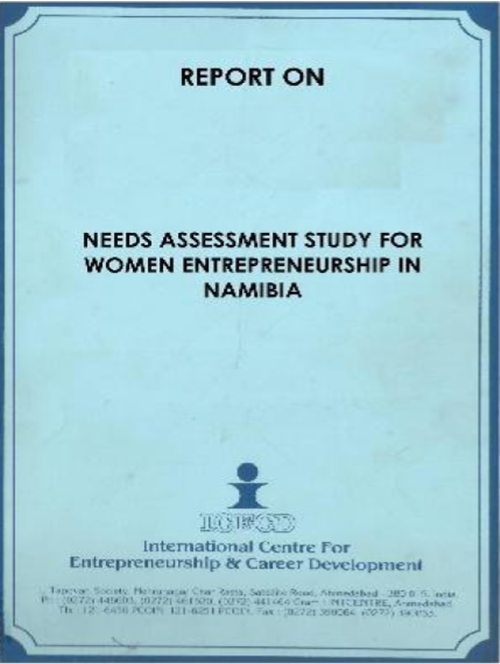 | Report of The Needs Assessment Study for Women Entrepreneurship in Namibia | Role of women and their place in society has become the subject of concern in most developing countries. Theoretically, in these countries, women have a place of honour and great respect, but there is a tremendous difference between ideals and aspirations, and the reality and practice, as we see today. Women are discriminated against at every stage. Poverty and illiteracy worsen their plight. Women do hold prime position in families and are socially very active in most developing countries. But they are left behind for various reasons, most of all being lack of exposure and education/training. Although women comprise half the world’s population as recent World Bank annual report points out, it has been observed that “Women as a group are amongst the poorest of the world’s poor – yet they do two-third of the World’s work”. In recent years, particularly, in the period following the declaration of the United Nation’s Decade for women, there has been an increasing awareness of the disadvantaged status of women and the need to promote social equality and reorganization of women as equal partners in development. As a response to this awareness, several studies and action programmes at the International, National and Regional levels have been carried out or are on-going, to identify and assess problems and evolve policies and measures to bring about solutions. However, this has resulted, in a clear perception of the nature and magnitude of the basic issues inhibiting women’s role in society and their development. |
| 17 | 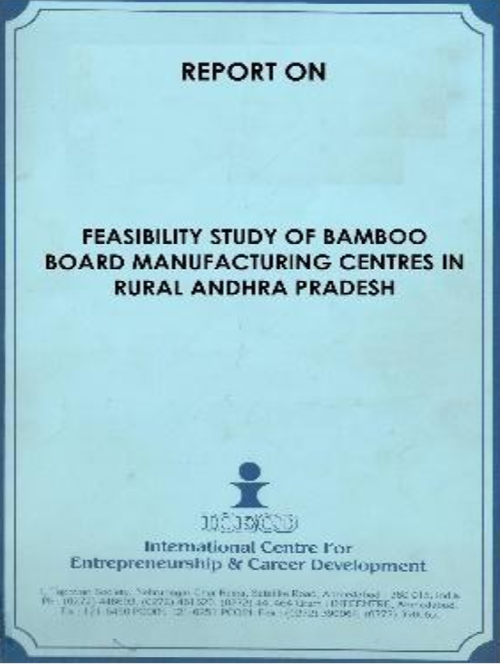 | The Feasibility Study of Bamboo Board Manufacturing Centres in rural Andhra Pradesh (Adilabad and Vizag) | The Royal Netherlands Embassy, New Delhi received a proposal from the Panchayati Raj and Rural Development Department of Government of Andhra Pradesh and TATVA, a Delhi based voluntary agency for establishment of bamboo board manufacturing units based on woven bamboo mats. The proposal was for a total of Rs. 17.2 million for two centres in rural Andhra Pradesh. The proposal envisaged setting up of two bamboo board manufacturing centres in which the major input is proposed to be woven bamboo mats which will be made by rural women of Andhra Pradesh, aiming to increase their income levels, thus offering employment/self-employment opportunities. For this purpose, about 1000 MTs of Bamboo is proposed to be supplied to 1000 – 1400 women spread around the proposed centres. The supplied bamboo is proposed to be converted into mats of required quality by the women and these mats are to be picked up by the centres, inspected and converted into bamboo boards. The marketing of bamboo board is proposed to be done by the agency in charge of the centre. |
| 18 | 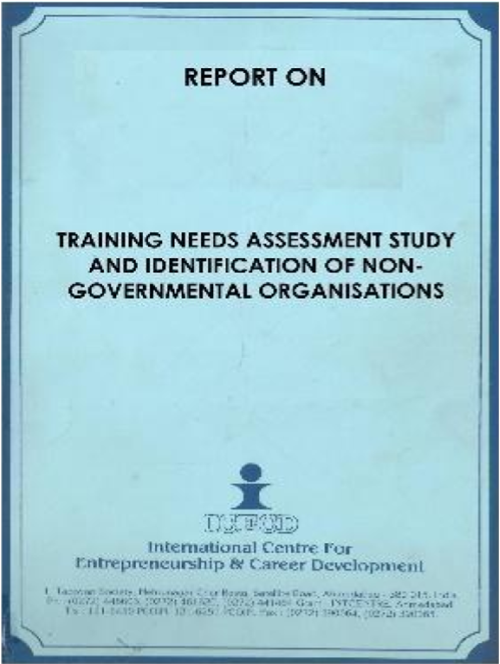 | Training Needs Assessment Study & Identification of Non-governmental Organizations in Four Target States of Western India (Gujarat, Maharashtra, Rajasthan and Madhya Pradesh) | Today, development of nation is judged by its level of industrialisation. For this, economists and development planners in the developing countries have pursued various policies and programmes for involving women in economic development by leading them towards micro and small enterprise establishment. With the adoption of specialised policies and programmes for women, a wide scope has been created in this area. The NGOs working through their facilitators/trainers, with the wide coverage that they have, act as catalysts in this developmental process. Hence, there is a need to update these facilitators/trainers with methodologies for skill and competency development so that they may lead women to establishing their own enterprises successfully. Secondly, the four broadly classified stages for enterprise creation, viz; product identification, resource mobilisation, enterprise establishment, operational management (including group formation in a group enterprise), are equally critical in determining prospects of an enterprise. Thus, till the facilitators/trainers are fully aware of the various aspects of developing an individual and an enterprise, economic development of women as such would continue to remain a finely-woven fantasy. |
| 19 |  | Feasibility Study on Women Entrepreneurship in Zambia | The PPAZ was set up in 1972 and is an NGO working in the field of Family Planning in Zambia. It has its Head Offices in Lusaka and operate throughout Zambia through its five Regional and 32 Branch offices. Its main support comes from IPPF to which it is affiliated. Although PPAZ’s main objective is to provide family planning information and services, it has been involved in other development and income generating activities, and women entrepreneurship development in Zambia is one of such projects. The Department of Community Development in the Ministry of Community Development and Social Services is involved in Community development and sponsors and runs developmental programmes that promote socio-economic development within communities. This is achieved by encouraging self-reliance in community planning and action, by encouraging communities to identify and solve their problems by their own means and hence achieve self-reliance, by motivating women towards income generation through formal and non-formal education and by developing leadership skills of community leaders. |
| 20 | 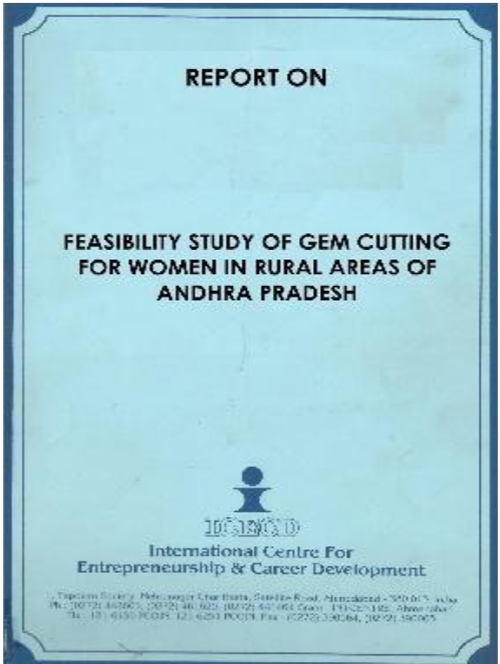 | Feasibility Study of GEM Cutting for Women in Rural Areas of Andhra Pradesh. | The Royal Netherlands Embassy, Delhi received a proposal from the Diamond and Gem Development Corporation (DGDC) for setting up 35 E-Centres for rural women in Gem Cutting trade in rural Andhra Pradesh at a total cost of Rs. 1,76,10,500, equivalent to US$ 570000, over a period of five years training 1250 women in the period. The task of considering the feasibility of this proposal was assigned to ICECD considering their expertise in the field of small and micro enterprise development and women entrepreneurship. The Institute has worked in this field since 1985 in India and 40 developing countries around the world on behalf of several national and international agencies. |
| 21 |  | Report on Needs Assessment Study for Women Entrepreneurship in Indonesia | Indonesia has taken giant studies since attaining freedom in taking up economic development activities through its various Five-Year Development Plans known as PEPILITAS. Whilst the country is in the midst of implementing REPILITAT-V, it is still at the cross roads of two worlds. On one side, large-scale industrialisation has taken place with support from the international community, which has brought in the latest technology at the door step, and has created many employment opportunities. On the other side, the country is still predominantly agricultural and unemployment is widespread, with large part of the population living below subsistence level. This has also led to the migration of population towards large cities resulting in overgrowing. Indonesian women constituting 52.3% of the population need to be brought into the main stream of this important economic development activity. The status of women in the male dominated society is, however, still very subordinate. They are engaged in the traditional feminine role of looking after home and children, and carrying out domestic chores, as in many developing countries. In the rural sector, womenfolk give a helping hand to their menfolk if they have own farms or work as casual labour. Some of them are engaged in home based tiny cottage industries to make their two ends meet. In the urban sector, whilst a small number is engaged in making professional careers and some have established their own business, most of them are looking after their homes and families. |
| 22 |  | Needs Assessment for Women Entrepreneurship in Thailand | A conference of policy makers, training institutions and government officials from 10 Asian countries was organized by ICECD in October 1989. The aim of the workshop was to find strategies for “fostering women entrepreneurship” systematically in these Asian countries and to make action plans for implementing the strategies identified. A senior official from Department of Industrial Promotion, Ministry of Industry, Government of Thailand had attended the workshop and basic action plan had evolved as a result of the interactions in this workshop. Since it was already involved in the entrepreneurship development activities, the ministry of industry was able to perceive the need for fostering women entrepreneurship and the need to undertake an extensive “Training Needs Assessment Study” for Thai women entrepreneurship was established. The Foundation for Asian Management Development was generous enough to sponsor the study, which was undertaken in September – October 1990. The activities in Thailand were co-ordinated by the Ministry of Industry, and were very well planned. As a result, a lot could be done in a short period. Discussions and interactions with Government and support agencies, financial institutions, women organizations and existing/potential women entrepreneurs helped in assessing the training needs. |
| 23 |  | Needs Assessment Report for Women Entrepreneurship in Nepal | In Nepal, one of the least developed countries of the world, there is an urgent need to accelerate developmental efforts and, in this context, it is essential to involve women to a greater extent. So far in Nepal, the status of women is one of the second-class citizens. Women accept stereo-type feminine roles. They are generally not encouraged to acquire training associated with industrial and economic development solely because it is felt that such characteristics are inconsistent with their traditional image. Competencies that are generally perceived for success in business, e.g., ambitions, toughness, objectivity, aggressiveness are looked on with disfavour in women. Various Organiations involved in women development activities have so far not started any specific entrepreneurship development training programmes on a national scale. Considering the need for such programmes, it is essential to formulate suitable policies and strategies at government and other policy levels |
